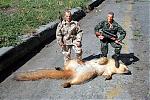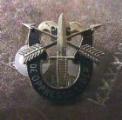http://www.pbs.org/wgbh/pages/frontline/kill-capture/j
Frontline did a special on Kill-Capture missions addressing the pro's and con's, many of which we debated endlessly on SWJ. The arguments for most sides are valid, but what jumped out at me from the coverage was the discussion between the locals (the 101st hit the wrong target due to inaccurate intelligence) and Afghan security forces accompanying the 101st. Even though they realized it was the wrong target they went ahead and searched the tribal leader's house in a pretty rough fashion, and since they found some small arms ammo (imagine that in Afghanistan) they used that as justification to detain him (he was released a few hours later). These mistakes happen all the time, because as Bing West points out we don't understand their language or customs beyond a superficial level. The ASF were put out with the Americans and their arrogance and clumsiness in handling this situation, and the locals wanted to know why the ASF let the Americans do this.
That is the million dollar question concerning Afghanistan. Why are we still leading missions, instead of supporting Afghans conduct them? They can do it their way, and their way will probably be better than ours. We are seen as occupiers and all the CMO and development in the world won't change that as long as we're conducting combat operations. I think it is long past time we take a step back and reassess. We don't need to be fighting their insurgency, we need to enable them to it their way. We may not like the results because the metrics won't be immediately observable, but over time we'll a change for the better if it is met to be.













Bookmarks